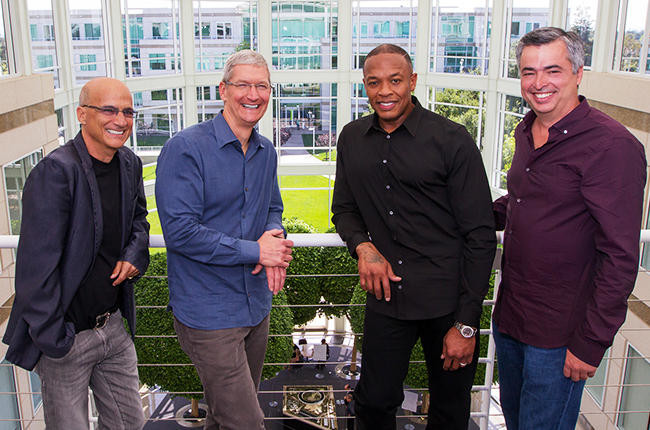
Posted by Mike McCready | April 21st, 2015 | No responses
Nearly a year after announcing its purchase of Beats — both its successful premium headphones division and its nascent-at-the-time, now-hibernating streaming service — for $3 billion, Apple is inching closer and closer to unveiling its much-anticipated revamp of that streaming service. Apple hasn’t revealed many details, not even a name for the new service, but when it does emerge, Beats will face stuff competition from market leader Spotify along with other streaming upstarts including Jay Z’s revamped Tidal and YouTube’s Music Key, still in beta.
By the time Apple finalized its acquisition of Beats late last summer, the company’s founders, Dr. Dre and Jimmy Iovine, had already joined Apple in executive roles. Apple CEO Tim Cook quickly praised the duo’s vision for the service on Charlie Rose, saying that the pair “recognized… human curation was important.” Since the Champagne corks popped, however, there have been more than a few distractions for Apple, including departing execs — such as Beats svp Bobby Gaza — and a lawsuit with someone claiming to be a co-founder of the company. By November, there were reports the rebranded Beats would debut in March of this year. Obviously, that didn’t happen.
All signs now indicate that Apple will debut the service at the Worldwide Developers Conference (WWDC), scheduled for June 8-12 in San Francisco, to coincide with the launch of its iOS 8.4 upgrade. According to reports, the streaming service will be baked into 8.4’s Music app, meaning users who update their phones will automatically have access to it should they choose to join. As Apple’s developer release notes reveal, the new version of the Music app includes an all-new design that encourages more personalization of playlists, a revamped “global” search and a streamlined iTunes Radio.
Despite Apple’s early attempts to offer a a treaming subscription at a lower price ($7.99) than every other for-pay service, though that pan was reportedly scuttled during negotiations with labels. Bloomberg suggests the company is now considering a two-tier pricing approach of $9.99/month for individuals and $14.99 for families. The company is expected to skip a ‘freemium’ offering, derided by label heads like Universal Music Group CEO Lucian Grainge in recent months. (As the recent IFPI report laid out, paid subscriptions contribute far more per listener than advertising supported streams. While free, advertising-supported listening accounted for double the global revenue of subscription streaming, that revenue was generated by far less than half the number of listeners. Spotify claims 15 million paid subscribers and 45 million free listeners — meaning it took three times the number of free listeners to only double the revenue. The result is that labels are far less willing to give Apple the kind of slice of the global pie that they did during their negotiations around the time of the iTunes Store’s launch in 2004.)
As for who is behind the redesigned app’s look, following last year’s acquisition Nine Inch Nails frontman Trent Reznor moved from his position as Chief Creative Officer at Beats Music to a similar role at Apple. According to a New York Times report, Reznor and a team of other Apple/Beats employees — including Iovine — are working on the app, which is expected to resemble Beats Music in features (curated playlists) but with a decidedly Apple-like aesthetic and sheen. An Android app for the Apple-ized Beats is expected to launch at a later date.
Apple Reportedly Buys Analytics Company Semetric Ahead of Beats Music Relaunch
Apple also made a bold statement in February by hiring former Radio 1 DJ Zane Lowe, who is said to be giving the lackluster iTunes Radio some much-needed attention in order to position it better against streaming radio leader Pandora.
Once launched, part of Apple’s initial strategy for attracting subscribers — other than being automatically installed on hundreds of millions of phones — will be offering exclusives from major artists. The company has reportedly approached Taylor Swift and others with offers, while Jay Z responded to rumors that Iovine had been trying lure some of Tidal’s bigger names with more money. “I think that’s just his competitive nature,” Jay told Billboard recently, “and I don’t know if he’s looking at the bigger picture: That it’s not about me and it’s not about him; it’s about the future of the music business.”
The newest headache for Apple comes courtesy of the European Commission, which is reportedly taking a look at Apple’s dealings with a number of record labels ahead the Beats launch. Several labels and digital music companies have been contacted by the European Commission and sent questionnaires requesting information about agreements that are in place. The inquiry does not necessarily mean the commission will launch a formal antitrust investigation. (It took the Commission five years of research before bringing a case against Google, for example.) Representatives from the E.U. refused a request for comment on whether the reported investigation would delay the new streaming service’s launch on the continent.
Since the launch of the iMac in 1998 through to the recent launch of the Watch — prompting many to ask what exactly it was for, like the iPad before it — Apple has launched or perfected to the point of domination pretty much every market its touched. That said, its failures have largely been software-related — Apple Maps, the social music network Ping, the launch of iCloud. The company’s bottomless checkbook and obvious investment in its upcoming streaming service seems to point to a success, even if achieved by sheer muscle.